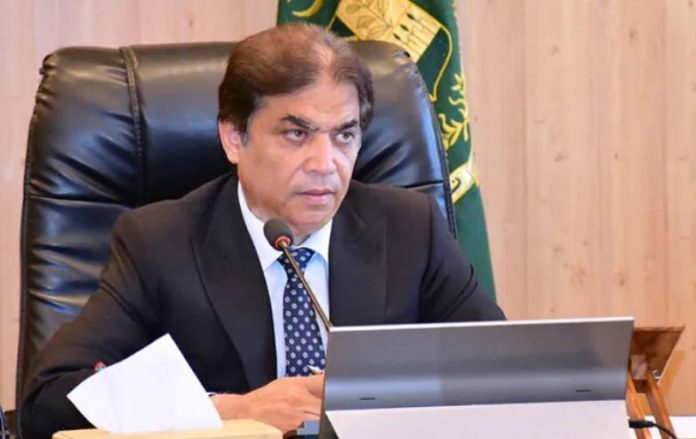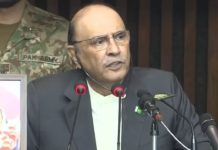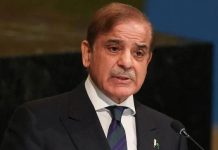FAISALABAD, NOV 05 (APP/DNA): Federal Minister for Railways Muhammad Hanif Abbasi said on Wednesday that Pakistan Railways is entering a historic new era of transformation, as the eight-month-long nationwide modernisation drive initiated under the direct guidance and vision of Prime Minister Shehbaz Sharif nears completion.
Addressing a gathering of media persons, parliamentarians, and local representatives at the newly refurbished Faisalabad Railway Station, the minister said the comprehensive modernisation programme — covering station upgrades, infrastructure renewal, digital reforms, and public service improvements — has brought Pakistan Railways back into the mainstream of national development.
He said the revitalisation campaign had been executed at an unprecedented speed and scale in the history of Pakistan Railways. Within months, major stations including Lahore, Karachi, Rawalpindi, Faisalabad, and Multan have been completely overhauled.
Abbasi said the upgraded stations now feature modern ticketing counters, air-conditioned waiting halls, renovated dining areas, digital display systems, clean restrooms, prayer facilities, and free public Wi-Fi. “This is not a cosmetic renovation but a durable structural change that has brought the century-old railway system into the twenty-first century. The credit goes to the Prime Minister’s consistent monitoring and timely policy direction,” he added.
The minister highlighted that the government had also launched an extensive programme to rehabilitate and expand railway corridors linking industrial, mineral, and urban zones. He said the Karachi-Rohri section had already been taken up for comprehensive rehabilitation, while another 500-kilometre stretch of upgraded track was currently under execution.
Abbasi further revealed that a separate package covering nearly 884 kilometres — including 400 kilometres of new track and 484 kilometres of modernisation work — was being finalised, with $2 billion in funding already earmarked for priority segments.
The Railways minister announced that groundbreaking for these projects would likely take place by June 2026, following completion of all pre-qualification and procurement processes. He said that Lahore-Rawalpindi and other heavily trafficked sections are being upgraded to double-track standards, and would support new passenger trains capable of running at speeds of up to 160 kilometers per hour and would significantly reduce travel time between major cities.
“Within the next couple of years, our passengers will experience world-class comfort, punctuality and safety in Pakistan’s railway service,” he added.
At Faisalabad station, the minister personally inspected the newly constructed family waiting hall with a capacity for over 600 passengers, along with restored platforms, lighting systems and a reconstructed Shorkot-Faisalabad section that had been severely damaged by floods last year.
He paid tribute to engineers, technicians and workers who labored day and night under tough conditions to meet targets. “Their devotion is the true foundation of Pakistan Railways’ revival,” he added.
He thanked corporate contributors and public institutions that assisted in the process and said that many local business groups including Faisalabad Chamber of Commerce & Industry (FCCI) played a commendable role by donating equipment, providing logistics and supporting maintenance.
Such public-private cooperation would remain central to future railway projects especially freight expansion and mineral corridor development, he added.
He elaborated on a new cargo and freight management model designed to generate up to Rs. 10 billion in additional annual revenue through improved logistics and reduced wastage.
He said that dedicated freight terminals are being built in Lahore, Faisalabad, Multan and Karachi to streamline industrial goods transport and attract private investment. “We are now shifting from dependency to self-sufficiency,” he said, adding that the introduction of automated tracking, digital invoicing and containerised freight systems would make Pakistan Railways a competitive logistics player in the region.
In social and welfare reforms, the minister announced new education and health initiatives for railway employees and their families. He said that three out of fourteen Pakistan Railways schools have already been outsourced to reputable educational organisations to raise teaching standards. One of these schools is situated at Karachi and two in Lahore while further outsourcing was planned in the next phase.
He said that free or heavily subsidised medical treatment would be available soon for railway employees and their dependents at affiliated hospitals under a new health insurance arrangement being finalised with provincial governments.
Turning to broader national issues, the minister said that railway progress reflected Pakistan’s overall stability and policy consistency under current leadership. He praised Pak armed forces and law enforcement agencies for maintaining peace that has allowed such large-scale infrastructure development to continue uninterrupted. “We must not forget that every track we lay and every train we launch depends on the sacrifices made by our security institutions,” he said, noting that the country faced hybrid and proxy challenges from anti-state elements. However, Pakistan’s unity, hard work and leadership resolve are defeating such designs, he added.
He also commended the Prime Minister’s foreign policy and said that it has restored investor confidence and revived international partnerships. “When leadership is strong and vision is clear, the nations move forward despite obstacles,” he said, referring to recent international pledges of cooperation in railway technology, rolling stock and mineral transport.
The minister outlined a timeline for remaining projects and said that by February 2026, multiple corridors would be functional fully and by 2027, Pakistan Railways would emerge as a profitable, modernised and citizen-friendly institution.
He said that detailed feasibility studies are underway for connecting the Chagai mineral belt and Kandi–Rohri section, describing both as “strategic economic arteries” for Pakistan’s industrial growth. He said that railway ministry is committed to transparency, performance and service delivery. “This revolution in Pakistan Railways is not symbolic; it is practical, visible and sustainable. Every worker, every engineer and every partner deserves credit,” he said, adding that new train inaugurations, digital service apps and advanced ticketing platforms would be introduced soon after the Prime Minister’s final approval.
“This is not the end. It is the beginning of a new chapter,” the minister said amid applause. “Under leadership of Prime Minister Shehbaz Sharif, Pakistan Railways is once again on track not just towards progress but towards pride, prosperity and national unity,” he added.
The minister also spoke at length about national security and foreign relations and said that Pakistan’s strength today lies in its balanced and assertive foreign policy led by the Prime Minister.
“Pakistan today stands more respected and stable than before. China, United States, Middle Eastern and Central Asian countries are strengthening their cooperation with us,” he added.
He said that hostile elements are disturbed by Pakistan’s progress and they are attempting to destabilise Balochistan and Khyber Pakhtunkhwa through terrorism and proxy warfare but Pakistani nation stands united and our enemies would once again face defeat.
Responding to a question about Afghanistan, the minister delivered a clear and firm message, stating that “Afghanistan’s peace and prosperity are inseparably linked with Pakistan’s stability. However, Afghan leadership has repeatedly misused our goodwill, he said, adding that for more than four decades, we sheltered and supported millions of Afghan brothers, provided them homes, food and opportunities but in return, we received betrayal.”
Recalling historical events, he said that from the 1965 war to the 1971 crisis, Afghanistan has consistently acted against Pakistan’s national interests. Even today, terrorists use Afghan soil to attack Pakistan and this cannot be tolerated, he added.
The minister said that Pakistan seeks friendship, not conflict but if the Afghan government fails to prevent cross-border terrorism, Pakistan may be compelled to take decisive measures for its own protection.
“We do not see Afghanistan as an enemy, but those operating from its soil against Pakistan are neither true Afghans nor Muslims. Terrorism has no religion and no nation and Pakistan would eradicate this menace at every cost,” he added.
He paid tribute to Pakistan’s soldiers and said that our martyrs have defended this homeland with their blood. Anyone who conspires against Pakistan’s integrity whether foreign or domestic will face a firm and unified national response.

















